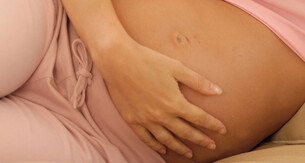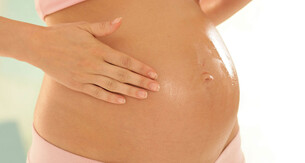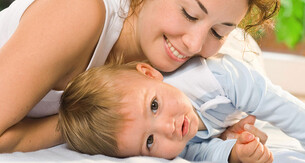Your baby’s development
Your baby’s joints and muscles should now be in the right place. Their nervous system has already begun to feel stimuli from their environment, such as when you put your hand on your belly. They’ll react by moving towards your hand, as it’s a source of warmth.
Your baby will also be sucking on their thumb a lot, training their vital sucking reflex for the time after the birth when they’ll need it to get nutrients from your breast milk.
Hiccups are also a form of training for life outside the womb. To coordinate their respiratory system, your baby is already practising their breathing during pregnancy by swallowing amniotic fluid, which they then expel from their body using their diaphragm. This is an important reflex which will help them in future to protect their lungs from substances that shouldn’t be there, such as water, milk or dust.
This extraordinary phenomenon is clearly visible in an ultrasound – seeing their thumb in their mouth and their little body hiccupping is always an emotional moment for the parents-to-be. Later on, you’ll be able to feel and see their hiccups – your whole belly will twitch at regular intervals.
The ultrasound scans
In most cases, two or three scans are enough during a healthy pregnancy. If your doctor decides to perform a scan, they’ll talk it through with you first. Be aware that your health insurance provider (if you have one) may only cover the costs for a certain number of ultrasound scans, so it’s a good idea to find out if that’s the case as soon as possible. And of course, you have the option to pay for additional scans yourself if you’re in a position to do so.
A 3D ultrasound is also used for detailed diagnosis, and you may already have had one by this stage. It allows deviations from expected development and potential deformities to be detected or ruled out early on.
In most cases, it’s purely a precautionary measure, and there’s no reason to worry. The basic recommendation is to have as few ultrasound scans as possible so that your baby is only exposed to as much ultrasonic radiation as necessary.
What it’s like for the mum-to-be in week 16
Your scales will clearly show that you’ve put on a bit more weight this month. That’s to be expected in each month of your pregnancy – in fact, it’s vital.
However, you’ll still be able to get around as normal during the middle months (such as in week 16). You can even still go on holiday, though it’s best to consult your gynaecologist first.
Depending on your personal wellbeing and fitness, you can still enjoy doing everything you want to do in week 16, whether it’s a trip abroad (including flying), hiking, playing sports or swimming. However, extreme sports are probably best avoided in your condition, especially if you didn’t do them regularly before your pregnancy.
Whenever you travel by car, make sure your seatbelt goes between your breasts and under your bump, resting on your pubic bone. This is the best way to protect your sensitive tissue and your baby, and there are special devices to keep the seatbelt in exactly the right position. Compression tights are also recommended.
Common signs and symptoms
From time to time in week 16, you’ll feel a slight pulling sensation in your abdomen, a sign that your womb is growing. If you bend forwards, you’ll be able to feel where the fundus (the top of your womb) is, as it’ll be around two finger widths above your pubic bone at this stage.
Back pain
You may also experience some lower back pain. This is due to the round ligaments supporting your womb, which are under a lot of pressure now that your womb is getting bigger to accommodate your baby. After a while this kind of back pain will ease, as the ligaments have stretched and adapted to the increased size of your womb.
Itchy belly, breasts and thighs
The parts of your body under the most strain, such as your belly, your breasts and your thighs, may now start to feel itchy as the skin covering these areas stretches. The itching can be relieved, for example, by applying a high-quality oil or body milk.
Sore breasts
When your breasts feel sore and painful, a few drops of colostrum (the first form of breast milk) may leak from your nipples. This is a good sign, as it shows that your breasts are preparing for breastfeeding. The colostrum also helps reduce the itchiness mentioned above, as it contains milk protein that softens your skin.
Your bump is growing
It will now be obvious that your belly is developing into your bump. Your trousers and skirts will get tighter and tighter, though there are ingenious inserts you can buy that extend the waistband of any pair of trousers. This won’t work for long, however, so it’s time to start filling your wardrobe with maternity wear. This doesn’t just mean trousers and skirts – you’ll also need loose-fitting tops, as your growing breasts will need more space inside your top.
Changes to your skin and hair
You might notice that your facial skin gets a bit darker in certain places, which is caused by changing hormone levels and will return to normal after you give birth. Your hair may also become darker in colour.
Midwife’s advice
‘Make sure you’re protected from the sun, as the areas that are darker may become even darker if you aren’t.’ Dorothee Kutz, midwife
Questions you may want to ask your doctor or midwife
Travelling and holidaying abroad
If you want go on a holiday before the baby comes, it’s best to tell your doctor where you’re planning to go and what you’re planning to do so that they can advise you on what’s a good idea and what isn’t. If you want to fly, bear in mind that some airlines require a doctor’s certificate before letting you on board. You can get one from your doctor or your gynaecologist.
Protecting against infections if you have cats
If you have cats, find out what steps you can take to minimise risks (you may have thought about this already). Cats can transmit toxoplasmosis, an infection which can be dangerous for you and your baby.
Information about the author:
Juliane Jacke-Gerlitz is a registered nurse. She has been working in the field of mother and breastfeeding counselling for more than ten years. Currently she is working as a medical writer and psychological consultant. Juliane Jacke-Gerlitz has been married for 22 years, is a mother of eight children and lives with her family in Halle.
 Chat with us on Messenger at m.me/hipp.ph
Chat with us on Messenger at m.me/hipp.ph






